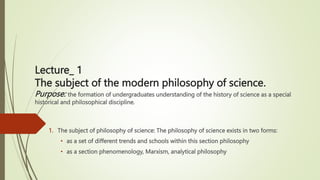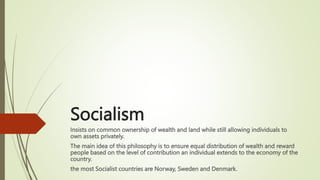((Marxism, Socialism and Communism).pptx
- 1. 1. The subject of philosophy of science: The philosophy of science exists in two forms: ŌĆó as a set of different trends and schools within this section philosophy ŌĆó as a section phenomenology, Marxism, analytical philosophy Lecture_ 1 The subject of the modern philosophy of science. Purpose: the formation of undergraduates understanding of the history of science as a special historical and philosophical discipline.
- 2. as a section phenomenology, Marxism, analytical philosophy, etc. which wide enough. This is ŌĆó the identification of the ideals, premises and foundations of science, ŌĆó clarification of concepts and principles, ŌĆó the specifics of various forms of activity and knowledge, ŌĆó clarification of the difference between science and other forms of activity, ŌĆó features mechanisms for the development and growth of scientific knowledge.
- 3. Phenomenology is a philosophy of experience. For phenomenology the ultimate source of all meaning and value is the lived experience of human beings. All philosophical systems, scientific theories, or aesthetic judgments have the status of abstractions from the ebb and flow of the lived world.
- 4. Marxism, Socialism and Communism The three terms often cause confusions among people, though they are similar in some of their views. Marxism, along with socialism and Communism were formulated to put an end to the Capitalist ideologies
- 5. Marxism Marxism is a social, economic and political philosophy that analyses the impact of the ruling class on the laborers, leading to uneven distribution of wealth and privileges in the society. It stimulates the workers to protest the injustice. The theory was formulated by Karl Marx and Fredrich Engels in their work.
- 6. Socialism Insists on common ownership of wealth and land while still allowing individuals to own assets privately. The main idea of this philosophy is to ensure equal distribution of wealth and reward people based on the level of contribution an individual extends to the economy of the country. the most Socialist countries are Norway, Sweden and Denmark.
- 7. Communism means the absence of private property. It insists the control of such assets be only in the hands of the Government. The government shall provide the people with all the necessities like education, medical aids and housing. Some of the countries that follow Communism are China, Cuba and North Korea.






